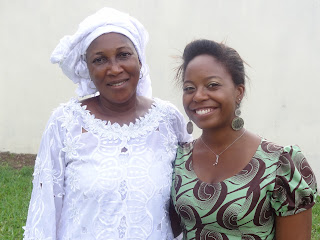The end of October brought us two holidays: Tabaski and Toussaint, which gave us two days off work and a chance to get some real cultural experiences while here.
Tabaski: October 26
Tabaski, the name of Eid al Adha in Francophone African countries, is one of the most important Muslim celebrations. Muslims are estimated to make up at least 40% of the population in Côte d'Ivoire, so the day is off from work. And a good thing too! Tabaski celebrates the sacrifice that Abraham made, when God asked him to sacrifice his only son. Since Abraham was willing to do it, God spared him and allowed him to sacrifice a sheep instead. Hence, Tabaski is the "sheep ceremony." Sheep were in high demand this year, and because many of the sheep come from the Sahelian countries (such as Mali, currently plagued by a rebellion and political crisis) the costs were exorbitant as the fête approached (upwards of 700,000 franc CFA = $1,400!!) You are supposed to slaughter the sheep after morning prayers, and then eat it all that day. That means inviting people over to help you finish it and sharing it with those who cannot afford to buy their own.
We were invited to a Tabaski celebration at a colleague of mine (see post about my arrival here, I mentioned her invitation). She was very welcoming, and served up heaping plates of fonio, a grain from the north, and sheep stew. It was delicious.
After eating, my colleague and her friend who had stopped by showed us how to do a dance that was associated with a song released shortly after Ouattara's win. It was the Ouattara Cucu dance!
Abissa – October 28-November 4
The following week, we had the day off to celebrate
Toussaint, or All Saints Day, A Catholic celebration. Instead of heading to the
église, we went to the beach! Direction: Grand Bassam to see part of the Abissa
celebration.
Abissa is a yearly festival by the N’Zima people that lasts
the entire last week of October. The N’Zima are part of the Ashanti ethnic
group (yes, from Ghana, consider that it was at one time a huge empire that
stretched across West Africa!) and living in the coastal areas near Grand
Bassam, the old colonial administrative capital of Côte d’Ivoire. The city
itself is quite beautiful; run down colonial mansions and buildings, remnants
of the French colonial order. Grand Bassam is about an hour from Abidjan, so we
headed that way with some Save the Children friends, ate lunch on the beach,
and then headed to the Abissa festival around 3.
According to this site, “During
this festival, social barriers are lifted and ‘anything goes.’” This was so
very true; there were tons of men dressed up like women! (the whole get-up: big
butts, boobs, wigs and dresses!) Women wore jewelry fashioned out of household
items: match boxes, condoms, kola nuts, cigarette boxes…
Abissa is also the moment to publically denounce any
transgressions one has committed, to confess to any wrongdoing (even the chiefs
participate) and to bring about social harmony.
Check out some of the videos and pictures I took here: Abissa .
We didn’t stay long for the ceremony, but the music was enthralling, the dancing was
impressive, and the cross-dressing men were just hilarious.
 |
| Abissa |




No comments:
Post a Comment